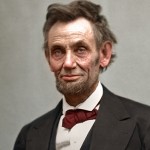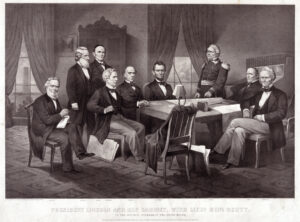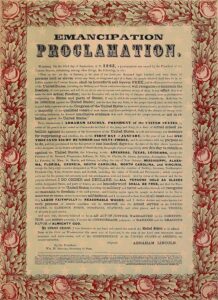 After informing his chief advisors and cabinet on July 22, 1862, that he would issue a proclamation to free enslaved people, President Abraham Lincoln added that he will wait until the Union Army has achieved a substantial military victory to make the announcement. One might wonder why the president would wait to make the announcement. It seems strange, but the reality is that he was attempting to stitch back together a nation that was being torn apart in a bloody civil war. His decision was a last-ditch, but carefully calculated, executive decision regarding the institution of slavery in America. Slavery was at the heart of the war, but at the time of the meeting with his cabinet, things were not looking good for the Union. to lose the war outright, could put an end to any possibility of freedom and of unity in this nation. The Confederate Army had overcome Union troops in significant battles, and to make matters worse, Britain and France were set to officially recognize the Confederacy as a separate nation. Lincoln was doing everything he could to see to it that that never happened.
After informing his chief advisors and cabinet on July 22, 1862, that he would issue a proclamation to free enslaved people, President Abraham Lincoln added that he will wait until the Union Army has achieved a substantial military victory to make the announcement. One might wonder why the president would wait to make the announcement. It seems strange, but the reality is that he was attempting to stitch back together a nation that was being torn apart in a bloody civil war. His decision was a last-ditch, but carefully calculated, executive decision regarding the institution of slavery in America. Slavery was at the heart of the war, but at the time of the meeting with his cabinet, things were not looking good for the Union. to lose the war outright, could put an end to any possibility of freedom and of unity in this nation. The Confederate Army had overcome Union troops in significant battles, and to make matters worse, Britain and France were set to officially recognize the Confederacy as a separate nation. Lincoln was doing everything he could to see to it that that never happened.
Lincoln’s plan was to issue the Emancipation Proclamation, which strangely, had less to do with ending slavery  than saving the crumbling union. In an August 1862 letter to New York Tribune editor Horace Greeley, Lincoln confessed that, “My paramount object in this struggle is to save the Union, and it is not either to save or to destroy slavery.” I never knew that, somehow. Lincoln was highly patriotic, and his objective was that of hoping that a strong statement declaring a national policy of emancipation would stimulate a rush of the South’s enslaved people into the ranks of the Union Army. He hoped that such a rush of manpower would resupply the Union forces, while depleting the Confederacy’s labor force, on which it depended to wage war against the North. Lincoln was against slavery, but he was for America more. That seems like a strange compromise, but I assume he thought freeing the slaves was a fight for another day. That decision would eventually get him killed.
than saving the crumbling union. In an August 1862 letter to New York Tribune editor Horace Greeley, Lincoln confessed that, “My paramount object in this struggle is to save the Union, and it is not either to save or to destroy slavery.” I never knew that, somehow. Lincoln was highly patriotic, and his objective was that of hoping that a strong statement declaring a national policy of emancipation would stimulate a rush of the South’s enslaved people into the ranks of the Union Army. He hoped that such a rush of manpower would resupply the Union forces, while depleting the Confederacy’s labor force, on which it depended to wage war against the North. Lincoln was against slavery, but he was for America more. That seems like a strange compromise, but I assume he thought freeing the slaves was a fight for another day. That decision would eventually get him killed.
Lincoln waited to unveil the proclamation until he could do so on the heels of a successful Union military  advance, just as he had promised. After a victory at Antietam, Lincoln publicly announced a preliminary Emancipation Proclamation on September 22, 1862, declaring all enslaved people free in the rebellious states as of January 1, 1863. Lincoln and his advisors limited the proclamation’s language to slavery in states outside of federal control as of 1862, which might seem odd, but if the war was lost by the Union, it wouldn’t have mattered anyway, and he needed the support of the North. Not all of the people in the north were in total agreement with the freeing of the slaves, although the vast majority were. The proclamation did not address the contentious issue of slavery within the nation’s border states. In his attempt to appease all parties, Lincoln left many loopholes open that civil rights advocates would be forced to tackle in the future. I have learned, in reference to politics, that many a politician has been forced to practice a little “appeasing” in order to get anything accomplished. I can’t say that is a good thing, but rather that it is sometimes a necessary thing.
advance, just as he had promised. After a victory at Antietam, Lincoln publicly announced a preliminary Emancipation Proclamation on September 22, 1862, declaring all enslaved people free in the rebellious states as of January 1, 1863. Lincoln and his advisors limited the proclamation’s language to slavery in states outside of federal control as of 1862, which might seem odd, but if the war was lost by the Union, it wouldn’t have mattered anyway, and he needed the support of the North. Not all of the people in the north were in total agreement with the freeing of the slaves, although the vast majority were. The proclamation did not address the contentious issue of slavery within the nation’s border states. In his attempt to appease all parties, Lincoln left many loopholes open that civil rights advocates would be forced to tackle in the future. I have learned, in reference to politics, that many a politician has been forced to practice a little “appeasing” in order to get anything accomplished. I can’t say that is a good thing, but rather that it is sometimes a necessary thing.


Leave a Reply